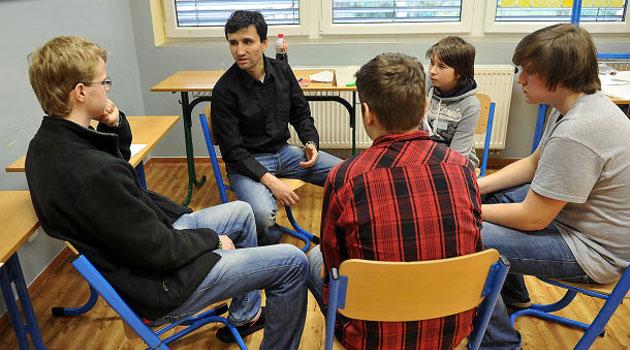"This has definitely helped me in that I became aware, from their stories, of how hard people can have it," says high school student Agáta Matějková of her experience with the Living Library. She won’t be borrowing Čápek or Hemingway there, but she is able to speak with the "books" she chooses – literally.
The educational project travels to primary and secondary schools where students "borrow living books" – people who are members of various minorities. Children can hear the stories of, for example, a homeless person, a Muslim from Syria, a Romani municipal police staffer, a Ukrainian activist, a visually-impaired ceramic artist, or a wheelchair user.
The "loan" is good for 20 minutes – usually four to five "readers" share one "book". The "living books" are involved voluntarily during their own free time and are not paid.
The "readers" can basically ask the books about anything they are interested in – they can learn how the people they are meeting live, what kinds of prejudice they grapple with in society, what amuses them and what they like. The main purpose of the exchange is to enhance tolerance and show how diverse Czech society is.
"We would like to tell our readers to pay more attention to those around them, to be open to learning something ‘different’, to try to look at today’s problems from the perspective of a minority or a specific individual. We mainly want to facilitate a personal experience for these children with the minorities they are hearing about every day from the media or from those closest to them, people whom they may have never met in person," Nela Armutidisová of Amnesty International tells news server Romea.cz.
The idea was first developed 15 years ago by the Danish "Stop the Violence" movement, which presented the first Living Library at the Roskilde Festival as a violence prevention tool. Back then the first "living books" were the festival participants themselves.
The concept then spread to other countries in various forms – in the Czech Republic the first Living Library was held by the Organization for the Support and Integration of Minorities in 2007. For the last two years it has been organized by the Amnesty International organization, among others, which has held 24 such "libraries" in drop-in centers, for the general public, and in the schools during that time.
Prevention of discrimination and intolerance
"I’m there as a representative of the Romani minority, which Czech society doesn’t know much about, and frequently they base what they do know on biased information from the media or statements made by politicians looking to score political points with this topic. There is a need to point out that we Roma have been a part of this society for many years and that much of what is said about Romani people is untrue. I’m glad about this project. Young people aren’t stupid, they known how to listen. There is a need to inform them," František Lacko, one of the "living books", told news server Romea.cz.
In addition to ethnic and national minorities, the "readers" can meet homeless people, immigrants, members of the LGBT community, people living with disabilities, people with chemical dependencies, refugees, religious minorities, and also people with alternative lifestyles, such as freegans or vegans. Those interested in the Living Library can meet its members at public events such as Brno’s Ghettofest or during Human Rights Week.
"I tried to imagine if my life were at risk, if I had managed to flee across three countries only to find they didn’t want to accept me where I was, they didn’t want to give me asylum. I felt sorry that not every country is hospitable. However, I am glad that these people are in the Czech Republic, that I can see them normally on the street," says Matějková of meeting two "living books", Jirka and Katrin from Iran, at her school. "My perception of foreigners has changed, I understand that they have a harder time of it, and I have begun to view them more positively."
